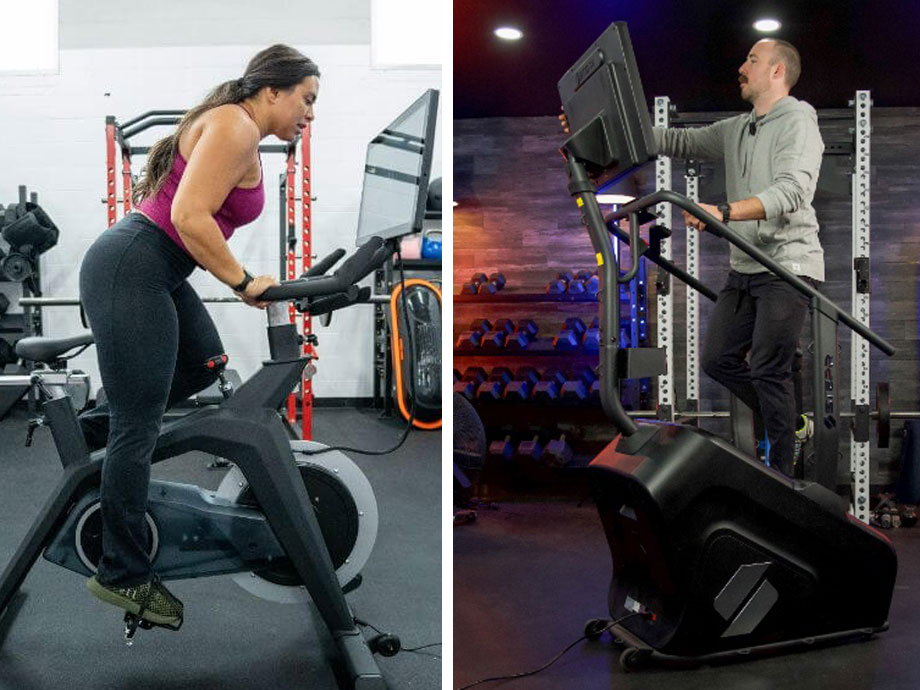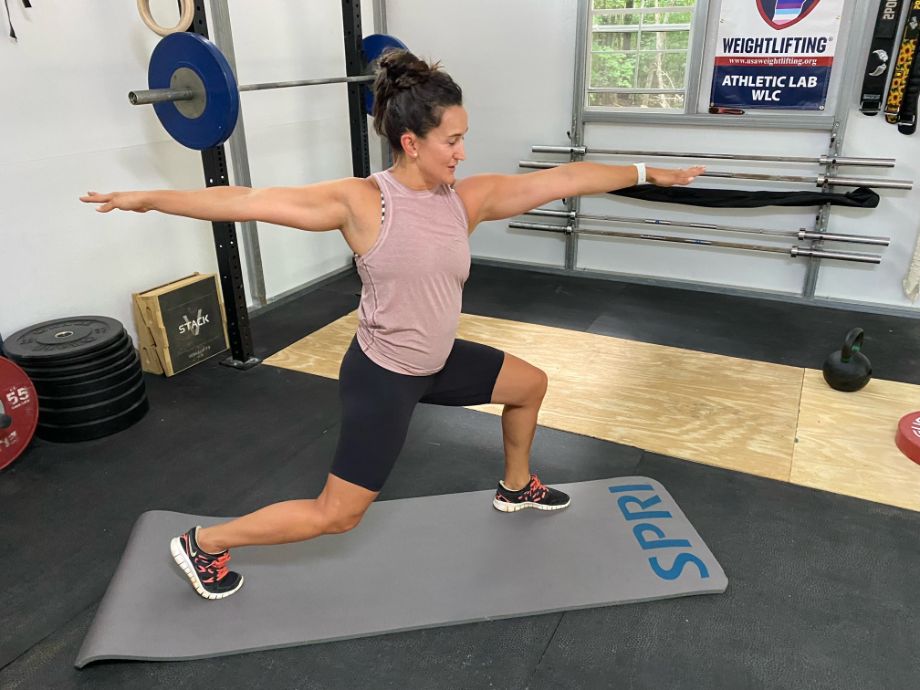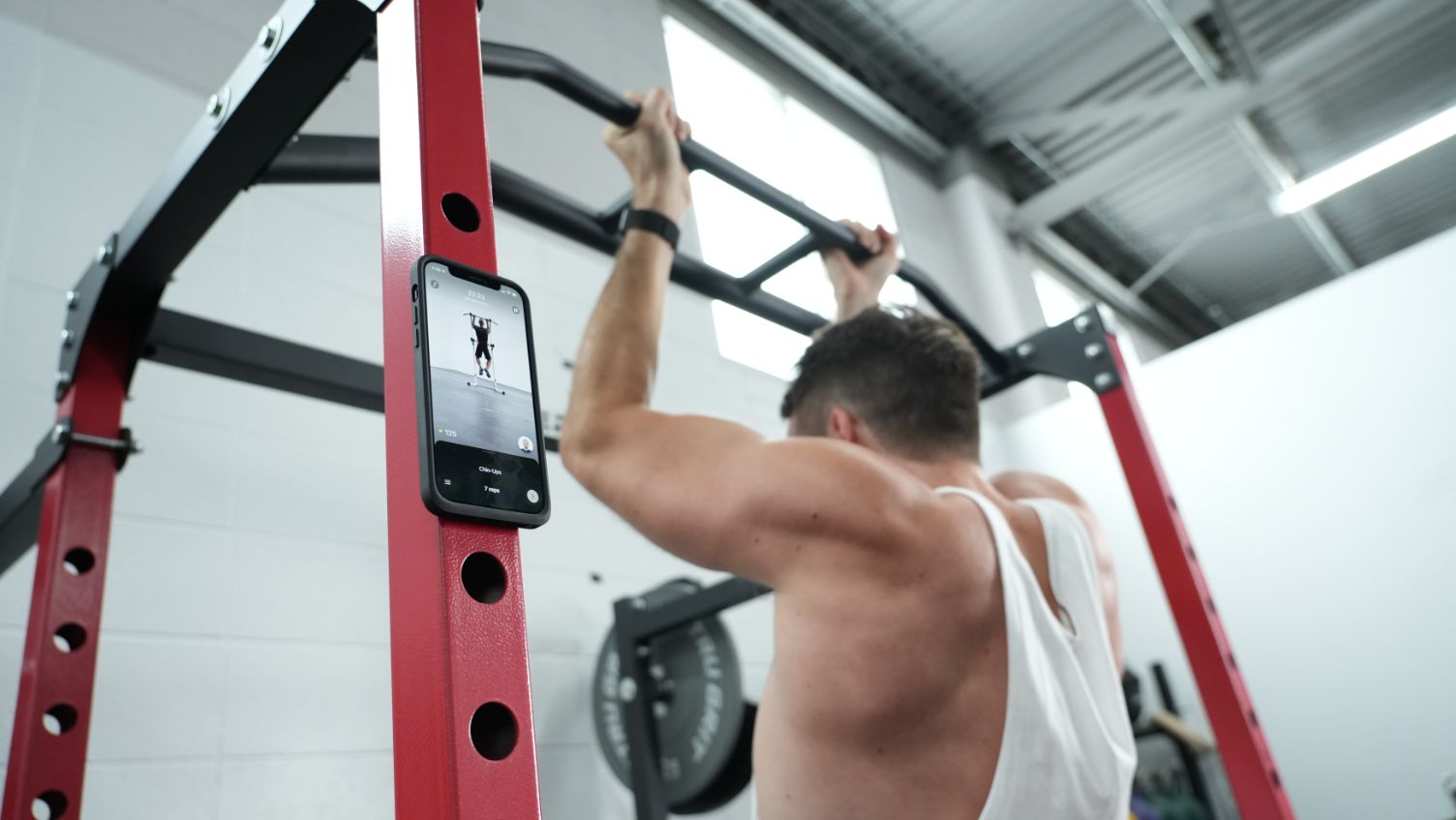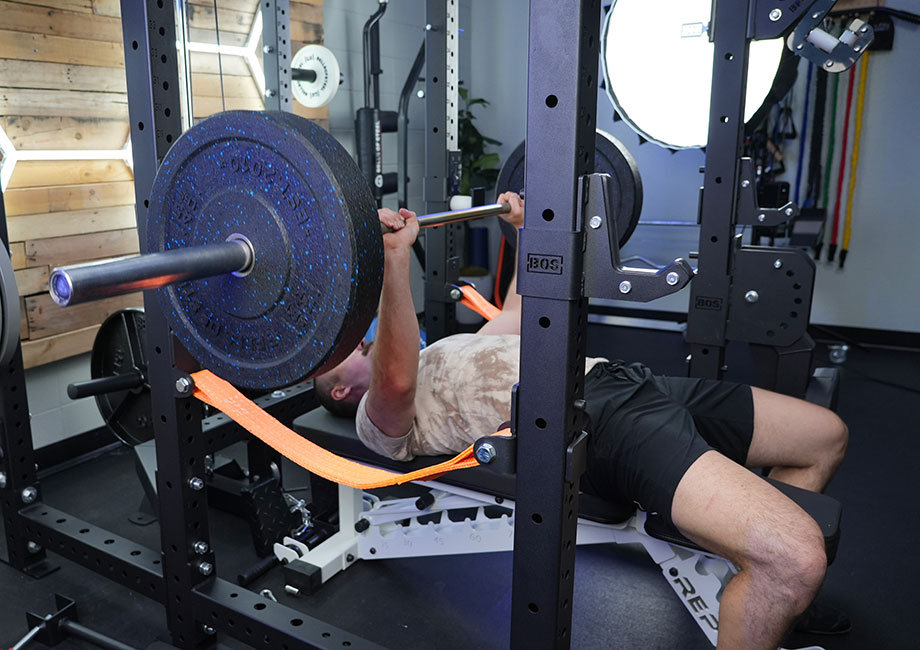The best cardio machines come in a wide range of sizes, price points, and functions, and it can be tough to choose which will best fit your home gym (or which you should dedicate your precious commercial gym time to). Today, we’re examining the stationary bike vs StairMaster for an in-depth look at how these two calorie burners compare. Your fitness goals, medical history, weight, size, and mobility all may factor into whether one of these machines would be the better fit for your weekly workouts.
At first glance, StairMasters and stationary bikes are pretty similar because they both provide a low-impact cardio workout that’s easier on the knees for those with mobility issues. So, users also need to consider any extras they’re looking for. Is your goal to build strength during your cardio workouts, or do you want that extra bit of motivation that comes with a machine featuring a large HD screen and access to a full library of programs through an accompanying workout app subscription? Also, how much vertical space can you dedicate to your new fitness equipment if adding to your home collection?
Keep reading as we put these machines under the microscope and try to answer all your (calorie) burning questions.
What Is a Stationary Bike?
Stationary bikes are a broad category of cardio machines that mimic the motion and energy expenditure of a road or mountain bike. They’re made in a variety of styles and can include a long list of features. Some are small and compact, folding to fit in a closet or under the bed. Larger exercise bikes may have up to 32-inch swiveling monitors for following on-demand or live spin workouts. Some models tilt forward and back for a realistic incline or tilt right and left to practice making turns, and adjustable bike seat heights (saddles), handlebars, and pedals can help users of different sizes get a solid fit and comfortable ride.
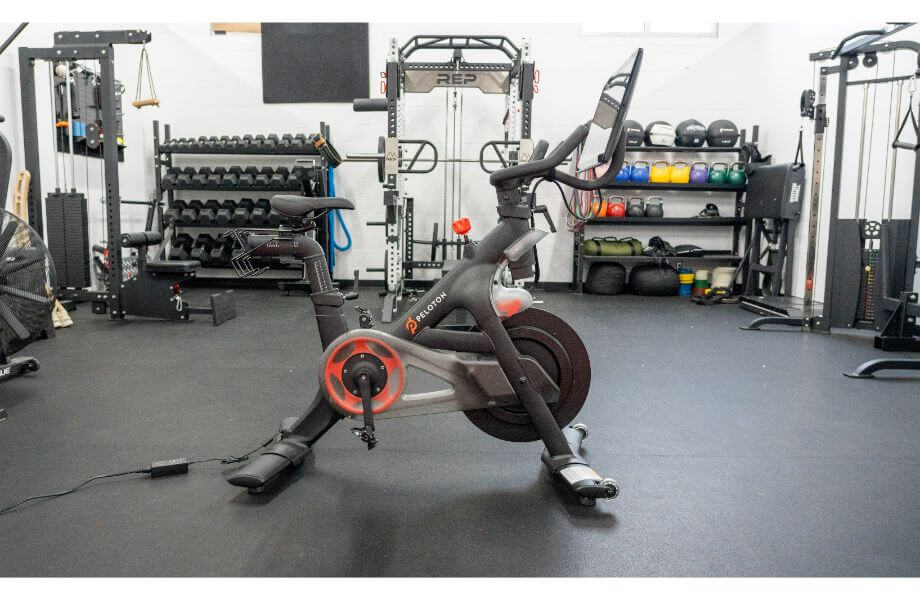
RELATED: Best Exercise Bikes For Home
Benefits of Using a Stationary Bike
Stationary bikes offer health benefits for athletes and non-athletes of all levels by activating the quads, glutes, hamstrings, and calves. The bike’s build, resistance levels, and features can help you get (or stay) in good physical condition. The stationary bike benefits are enough to seriously consider a stationary bike for your home gym.
Helps Improve Your Cardio Fitness
Stationary bikes provide excellent cardiovascular benefits. In a 2019 study that explored the effects of cardio exercise on insulin sensitivity, cardiorespiratory health, and abdominal fat¹, a stationary bike was used to measure cardio health over six months. Study participants could use a stationary bike along with other types of cardiovascular exercise throughout the study. At the end of the six months, participants experienced better cardio fitness, improved insulin sensitivity, and lost abdominal fat.
It’s a Low-Impact Exercise for Your Knees (and Back)
A stationary bike might be an excellent alternative if your knees can’t handle running or other high-impact aerobic exercises. A 2010 article published in Physical Therapy reviewed methods that reduce osteoarthritis-related knee pain² and included the use of stationary bikes as a good option because of the low impact on joints. However, make sure you adjust your bike’s seat height. A 2012 literature review³ exploring seat heights found that a 20- to 30-degree angle helps reduce knee stress.
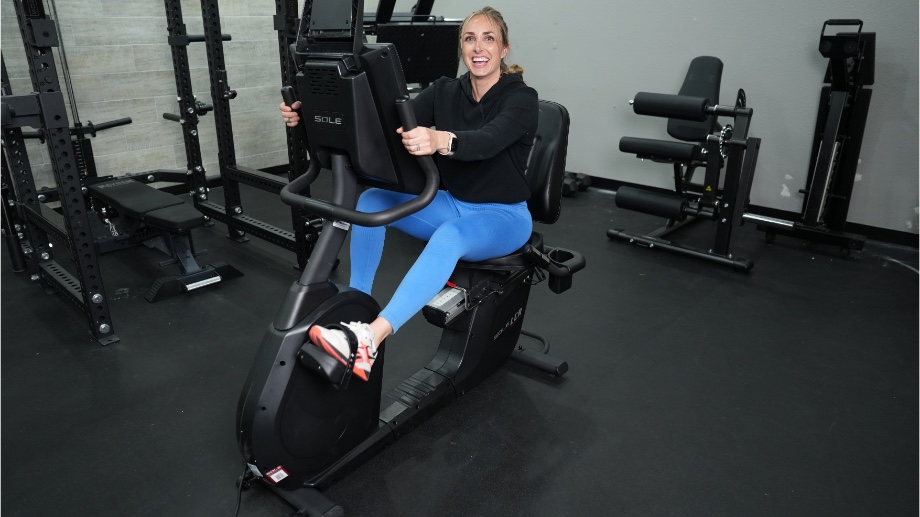
If you have a particularly sensitive back or knees, consider a recumbent exercise bike. Recumbent bikes take even more stress off of your knees and lower back. They have a seat with back support, and the rider’s legs reach forward toward the pedals in front of rather than beneath the seat. You’ll also still be able to participate in interval training like HIIT without upsetting your joints.
RELATED: 4 HIIT Bike Workouts
Helps Protect Your Circulatory Health
Stationary bikes can help bolster your heart health, offering similar benefits for preventing and slowing peripheral artery disease⁴ (PAD) as found in a study that compared using a stationary bike with treadmill use. A stationary bike showed similar benefits to a treadmill but provides a lower impact option while still protecting your circulatory health.
Helps Burn Calories
Like other forms of aerobic exercise, riding a stationary bike boosts your heart rate and burns calories. According to a 2019 comparative study⁵, you can burn anywhere from 10 to 14 calories per minute while riding an upright stationary bike. The numbers are a little lower for recumbent bikes at eight to 12 calories per minute. Of course, the higher the intensity, the more calories you burn.
RELATED: Recumbent Bike Vs Upright Bike
What Is a StairMaster?
StairMaster is a brand name that’s also often used to describe a stationary cardio machine that creates a motion similar to climbing stairs. Some models have rotating steps, while others have two steps under resistance, to which you apply alternating pressure. The larger models with rotating stairs are more common in professional gyms than in residential homes. Models with pedals are generally smaller, more compact, and easier to have in your home gym.
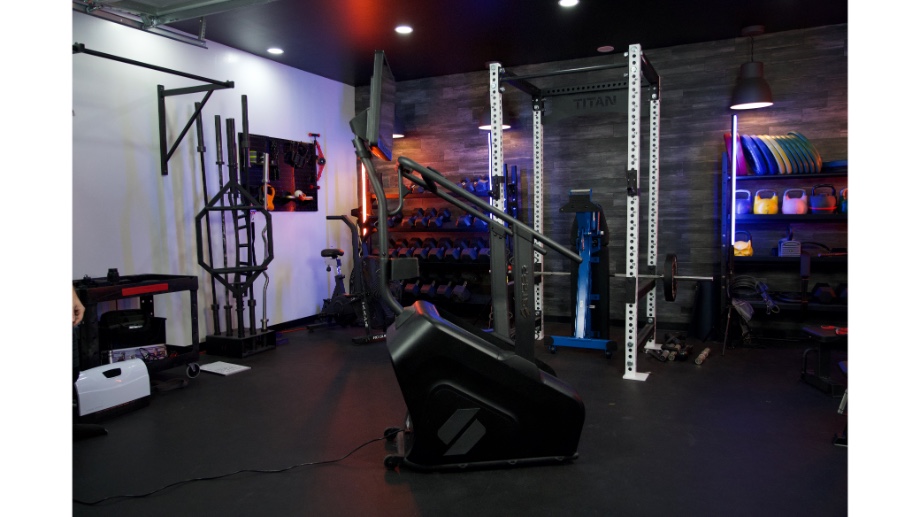
RELATED: Best Stair Climbers For Home
Benefits of Using a StairMaster
StairMasters offer an intense cardio workout that targets the lower body, primarily your quads, glutes, hamstrings, and calves. Activating these large muscle groups can help raise your heart rate for health-sustaining benefits.
Helps Build Aerobic Health and Endurance
Like stationary biking, StairMasters build aerobic endurance by bumping up your heart rate and keeping it there. These machines keep your heart strong and improve the body’s use of oxygen⁶. Regular aerobic exercise, including that done on a Stairmaster, strengthens the heart and makes the body a more efficient oxygen user.
May Burn Extra Calories
The previously mentioned 2019 comparative study found reports that a stair stepper can help you burn 12 to 15 calories per minute, depending on the resistance and speed. When used alongside a healthy diet, those extra calories can help with weight loss or maintaining a healthy weight.
RELATED: Walking For Weight Loss
Helps Build Leg Strength
Anyone who has to take several flights of stairs daily knows that stairs can help build muscle. Both a 2013 study⁷ and a 2018 study confirm what we’ve all known all along—that climbing stairs can build leg strength⁸. You can get those same leg-building benefits by regularly using a StairMaster.
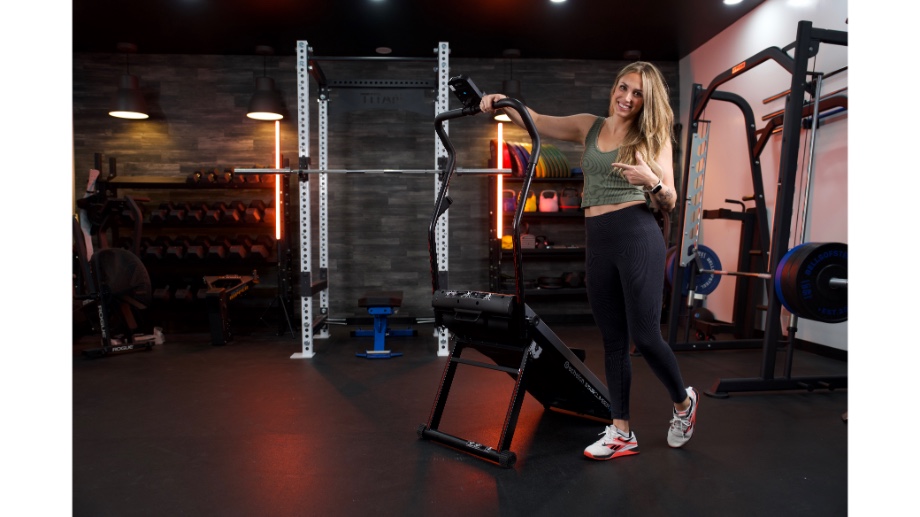
Helps Reduce High Blood Pressure
The same 2018 study that explored leg strength also looked at stair climbing’s effect on blood pressure. Participants’ blood pressure lowered with regular stair climbing8, making a StairMaster an option if you’re trying to improve your blood pressure numbers.
Differences Between a Stationary Bike and a StairMaster
These two cardio machines have many of the same benefits. They burn calories, work leg muscles, and provide solid cardio workouts, which come with better heart health. But their differences should help you decide if one of these machines belongs in your home gym.
Here’s a quick comparison of two models:
| NordicTrack S22i | StairMaster SM3 StepMill | |
| Price | Around $2,000 | Around $3,000 |
| Weight | 298 lbs | 298 lbs |
| Footprint | 61″ L x 22″ W x 58″ H | 29″ L x 46″ W x 73″ H |
| Weight capacity | 350 lbs | 275 lbs |
| Display | 22″ rotating touchscreen | LCD screen |
| Programming | iFIT interactive programming with subscription | 25 pre-programmed workouts |
| Warranty | 10-year frame, 2-year parts, 1-year labor | Lifetime frame, 5-year mechanical, 2-year electronics, 1-year labor |
For a more in-depth assessment, read our full NordicTrack S22i review.
Muscles Targeted
Both machines target the lower body and leave the upper body fairly inactive. However, stationary bikes may give you more options that are less intense, especially on your quads and hamstrings. In general, a stationary bike puts less stress on your knees and hips than a StairMaster.
While a stationary bike works your quads and hamstrings⁹, the load is lighter than elliptical machines, treadmill walking, or outdoor walking, according to a small 2012 comparative study. Keep in mind you can increase the resistance with most stationary bikes to take your moderate workout to a higher intensity.
A StairMaster also targets your lower body but places more stress on your quads and hamstrings than on a stationary bike. StairMasters also activate your glutes and calf muscles¹⁰ in ways that a stationary bike doesn’t due to the motion and joint angles required by the stepping motion.
Difficulty Level
Stationary bikes are generally easier to use than stair steppers, primarily because you’re seated. There’s some balance involved, but beginners will find that the balance required for a stationary bike is far less than on a road bike. Recumbent bikes are even easier to use because you don’t have to balance on the seat at all.
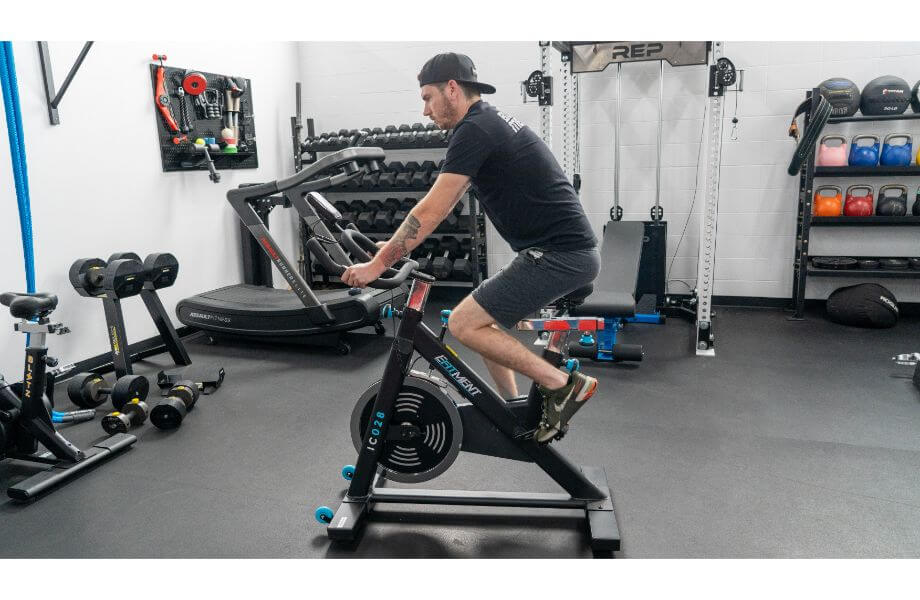
StairMasters aren’t difficult to use, but models with a moving belt can take some getting used to. Plus, getting on and off these machines requires more balance and care than most stationary bikes.
Calories Burned
Minute per minute, you’ll generally burn more calories on a StairMaster than on a stationary bike. You can adjust the difficulty from low to high intensity via the speed feature on a StairMaster (resistance as well on pedaled models) and using speed and resistance with a stationary bike.
Keep in mind that overall calorie burn depends on personal factors. Your body weight, gender, fitness level, and workout intensity ultimately determine your total calorie burn.
Muscle and Joint Load/Stress
The same small 2011 study that compared muscle activation between an elliptical trainer, stationary bike, treadmill walking, and overground walking found that a stationary bike puts a relatively light load on the quadriceps and hamstrings. Both get utilized when using a stationary bike, and you can increase the load by increasing the resistance.
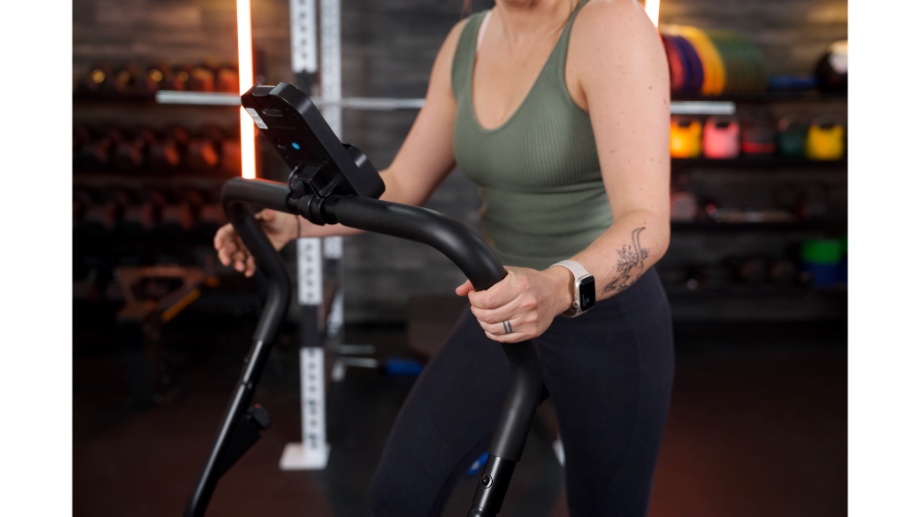
On the other hand, stair climbers put an increased load on your ankles and knees. As you go faster, your hips will get activated, too. Consequently, if you have joint pain, a StairMaster has more potential to aggravate that pain.
How To Choose Between a Stationary Bike and a StairMaster
These two cardio machines can have similar health benefits, but how they achieve that is different. One might be a better pick depending on your cardio goals and health conditions.
Stationary bikes offer:
- Low-impact workouts
- Less stress on your lower-body joints
- Seat and (sometimes) handlebar adjustability for a better user fit
- Adaptable cardio workouts with adjustable speed and resistance
- Ease of use for those with poor mobility and/or balance
Additionally, stationary bikes are much more likely to come with screens and fitness apps with exercise programs and workouts far beyond the bike itself. They can include access to off-bike workouts, a personal trainer, and full-body workouts that StairMasters generally don’t.
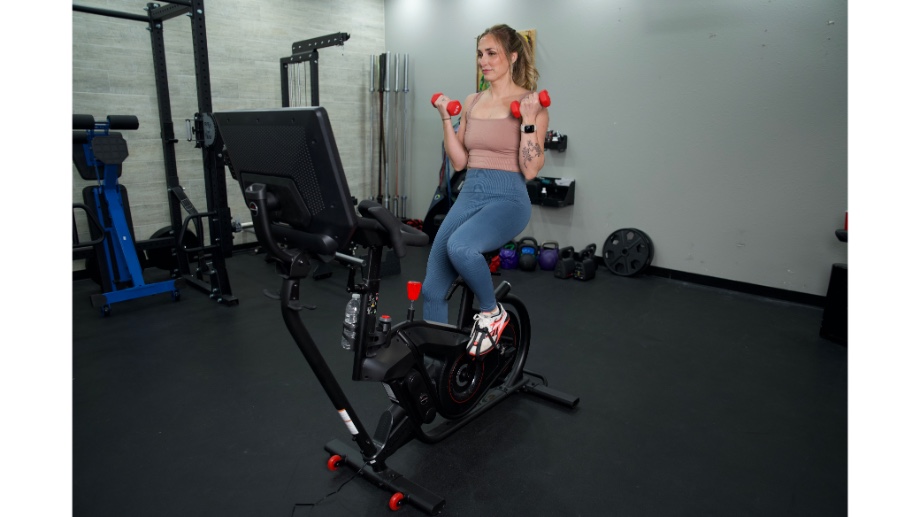
RELATED: How To Choose An Exercise Bike
StairMasters bring a lot to the workout table, too, including:
- Strength training, along with more intense cardio workouts
- Speed adjustability
- Higher calorie burn
However, you’ll still have to weigh the cons. Stair-climbing tests¹¹ are sometimes used to identify the early stages of osteoarthritis because that’s where people often notice their knee problems first. A stationary bike may be easier on your joints, though you won’t burn as many calories minute by minute.
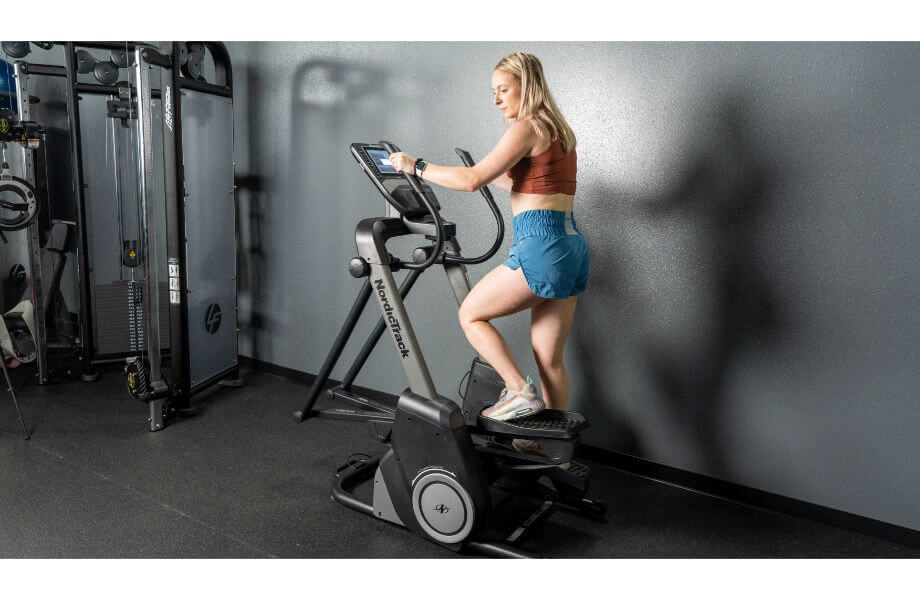
Also, consider your budget. StairMasters are generally more expensive than stationary bikes, though premium stationary bikes with large monitors, subscription services, and access to on- and off-bike workouts can get expensive, too.
Stationary Bike Vs StairMaster: Final Thoughts
Stationary bikes and StairMasters are excellent machines for maintaining and improving overall cardiovascular health and targeting lower-body muscles. However, their differences might make one a better fit for your fitness goals or home gym set-up.
- Stationary bikes offer a low-impact workout with less lower-body joint stress.
- StairMasters tend to burn more calories per minute than stationary bikes, but place a heavier load on your joints.
- Some stationary bikes come with large monitors that can connect to integrated apps, offering on-demand and live workouts.
- You can increase the effectiveness of either machine by adjusting the resistance and/or speed.
- These machines differ greatly in overall cost, so budget is definitely a factor when choosing between them.
Stationary Bike Vs StairMaster: FAQs
Is stair climbing better than cycling?
Stair climbing can burn more calories than cycling when putting in similar time and effort. However, stair climbing is harder on your knee joints. If you have sensitive knees, your joints might be happier if you increase your speed and resistance on a stationary bike for greater calorie burn.
Is StairMaster better for fat loss?
StairMaster can burn more calories per minute than a stationary bike, which could make it better for fat loss. StairMasters can also strengthen the muscles of your lower body—more muscle means more calories burned. But then again, you have to weigh the pros and cons and whether or not your joints can handle the stress of a StairMaster if you’re dealing with joint issues.
Is 30 minutes on a stationary bike enough?
The U.S. Department of Health and Human Services12 recommends 150 minutes of moderate-intensity exercise per week, which you can break down into five 30-minute sessions. A moderate-intensity 30-minute workout on a stationary bike is enough to improve or maintain your cardiovascular health. At a moderate intensity, you should be able to talk but not sing while exercising.
Which cardio machine burns the most fat?
Fat burning depends on many factors. However, according to the previously cited 2019 comparative study, treadmills lead the way in calorie burning (and therefore fat burning) at 11 to 18 calories per minute. However, if only comparing StairMasters and stationary bikes, the StairMaster wins.
References
- Blond M.B., Rosenkilde M., Gram A.S., et al. (2019). How does 6 months of active bike commuting or leisure-time exercise affect insulin sensitivity, cardiorespiratory fitness and intra-abdominal fat? A randomised controlled trial in individuals with overweight and obesity. British Journal of Sports Medicine, 53(18), 1183-1192.
- Lin, C., Taylor, D., & Maher, C. G. (2010). Exercise for Osteoarthritis of the Knee. Physical Therapy. Physical Therapy, 90(6), 839-842. https://doi.org/10.2522/ptj.20100084
- Bini, R., Hume, P., and Croft, J. (2012) Effects of bicycle saddle height on knee injury risk and cycling performance. Sports Medicine. 41: 463-476. https://doi.org/10.2165/11588740-000000000-00000
- Solakovic, S, et al. (2019). The comparison of stationary bike training and standard treadmill therapy in overweight and obese patients age 40-55 with peripheral artery disease (PAD) in Fontaine’s stage IIa on high does supplementation support of alpha-lipoic acid (ALA). American Journal of Sports Science and Medicine. 7(2), 51-60. DOI:10.12691/ajssm-7-2-5
- Jensen, M., et al (2019). A comparison of energy expenditure when exercising on 10 indoor exercise machines. International Journal of Research in Exercise Physiology. 14(2), 84-94.
- Radak, Z., et al. (2013). Oxygen consumption and usage during physical exercise: The balance between oxidative stress and ROS-dependent adaptive signaling. Antioxidants & Redox Signaling. 18(10). https://doi.org/10.1089/ars.2011.4498
- Donath, L., Faude, O., and Zahner, R. (2013). Effects of stair-climbing on balance, gait, strength, resting heart rate, and submaximal endurance in healthy seniors. Scandinavian Journal of Medicine & Science in Sports. 24(2), e93-e101. https://doi.org/10.1111/sms.12113
- Wong, A., et al. (2018). The effects of stair climbing on arterial stiffness, blood pressure, and leg strength in postmenopausal women with stage 2 hypertension. Menopause: The Journal of The North American Menopause Society. 25(7), 000-000. DOI: 10.1097/GME.0000000000001072
- Prosser, L., et al. (2011). Comparison of elliptical training, stationary cycling, treadmill walking, and overground walking. Gait Posture. 33(2), 244-250. doi: 10.1016/j.gaitpost.2010.11.013
- Lewis, J., et al. (2015). Changes in lower extremity peak angles, moments and muscle activations during stair climbing at different speeds. Journal of Electromyography and Kinesiology. 25(6), 982-989. doi: 10.1016/j.jelekin.2015.07.011
- Ijima, H., et al. (2019). Stair climbing ability in patients with early knee osteoarthritis: Defining the clinical hallmarks of early disease. Gait & Posture. 72, 148-153. https://doi.org/10.1016/j.gaitpost.2019.06.004
- U.S. Department of Health and Human Services (2023). Physical activity guidelines for Americans. Accessed June 11, 2024. https://health.gov/our-work/nutrition-physical-activity/physical-activity-guidelines


